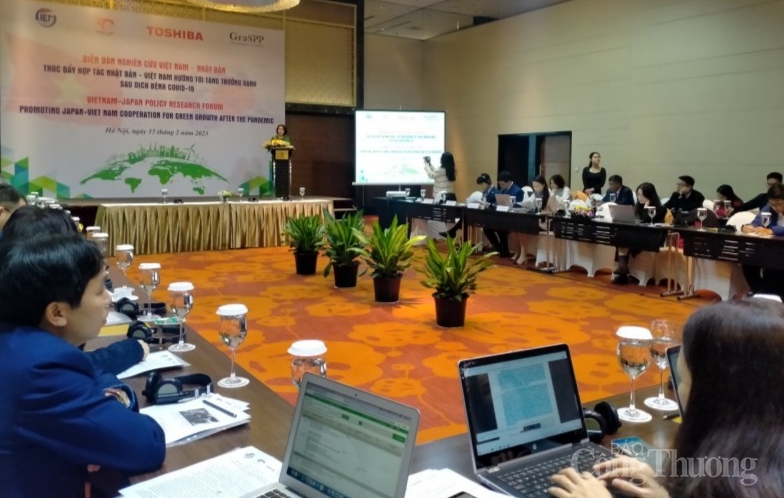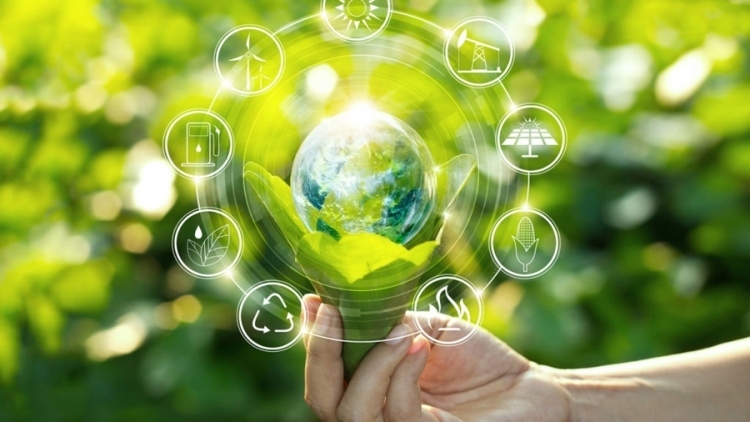Vietnam needs to step up efforts to achieve carbon neutrality by 2050
VOV.VN - The Vietnam - Japan Research Forum on promoting Japan - Vietnam cooperation towards green growth after the COVID-19 pandemic was held in Hanoi on February 15 as part of activities to celebrate the 50th anniversary of Vietnam – Japan diplomatic ties (1973-2023).

The delegates focused on discussing and analyzing new domestic and international trends and developments along with the driving forces behind green growth efforts in Vietnam.
Orientations and recommendations aimed at bolstering Vietnam-Japan cooperation towards green growth after the COVID-19 pandemic were also raised for discussion at the event.
Speaking at the Forum, Dr. Tran Thi Hong Minh, director of the Central Institute for Economic Management (CIEM) said that over the past years, the world has been witnessing major trends in geopolitics, Industrial Revolution 4.0, digital transformation, and climate change.
In order to solve the challenges of climate change, towards green growth after the COVID-19 pandemic, according to CIEM experts, over the past time, economies have recognized the need to make more efforts and increase international cooperation on contents associated with green economy, green growth towards sustainable development.
A series of important commitments were made by economies, including the developing ones, at the Conference of the Parties to the United Nations Framework Convention on Climate Change in 2021 and 2022 (COP26 and COP27).
In addition, there are frameworks and action programs associated with structural reform and green recovery, development of the bio-circular - green economy, within the framework of APEC and ASEAN.
“As one of the countries most vulnerable to climate change, Vietnam has stayed proactive in proposing many adaptation solutions to minimize the impacts of climate change. At COP26, Vietnam has made strong commitments, including bringing net emissions to "zero" by 2050", Dr. Tran Thi Hong Minh said.
In addition, commitments on sustainable development have also been included in new-generation free trade agreements (FTAs) such as CPTPP (Comprehensive and Progressive Agreement for Trans-Pacific Partnership) and the EU-Vietnam Free Trade Agreement (EVFTA) to fulfill those ambitious commitments.
Kazuo Kusakabe, Chief Representative of Toshiba Asia Pacific Pte Ltd, stated that climate change is a challenge for the world, including Vietnam at the moment.
In fact, in order to deal with the challenges of climate change, over the past time, Vietnam has had cooperation programs with Japan in general and cooperation with Japan in the field of green growth in particular.
These activities are particularly important for Vietnam. The nation has obtained many important results and achievements in cooperation with Japan, especially in the fields of investment, import and export, sustainable infrastructure development, and human resource development.
According to a report of the Foreign Investment Agency under the Ministry of Planning and Investment, Japan has always been one of the largest foreign investors in Vietnam.
Japan and Vietnam still have a lot of potential to boost cooperation on green growth, when both countries are members of the CPTPP, which has been put into effect, or the Indo-Pacific Economic Framework (IPEF) that is in the negotiation process. Both CPTPP and IPEF have cooperation contents related to green growth.
Besides, some key areas with great potential for cooperation between Japan and Vietnam include electrical and electronic equipment, wooden architecture, wind power, biomass power, solar power, organic aquaculture and organic farming.
On that basis, according to CIEM, Japan and Vietnam can consider four orientations for stronger cooperation towards green growth in the coming time, including: Firstly, improving institutional and regulatory capacity, policies related to green growth; secondly, sustainable infrastructure development in Vietnam, thirdly, cooperation to promote low-carbon, low-emission value chains and fourthly, cooperate and promote the development of international treaties, rules and international standards related to green growth.
However, according to Kazuo Kusakabe, from now to 2050, Vietnam also does not have much time left to achieve the goal of net zero emissions by 2050, thus moving towards a green economy, responding to change climate, the Government of Vietnam needs to step up the approval of large projects regarding green growth activities.
According to economic expert, Dr. Vo Tri Thanh, director of the Institute for Brand and Competitive Strategy Research, to achieve the goal of net zero emissions by 2050, Vietnam "cannot go it alone" but needs to further boost international cooperation, and devise solutions to mobilize domestic and international private capital to fulfil this goal.

